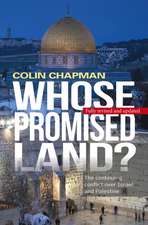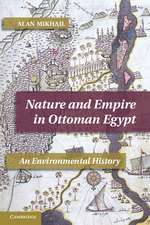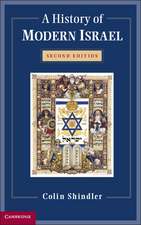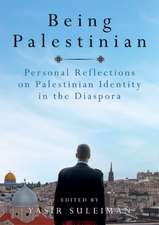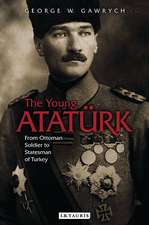State, Faith, and Nation in Ottoman and Post-Ottoman Lands
Autor Frederick F. Anscombeen Limba Engleză Paperback – 16 feb 2014
| Toate formatele și edițiile | Preț | Express |
|---|---|---|
| Paperback (1) | 238.72 lei 43-57 zile | |
| Cambridge University Press – 16 feb 2014 | 238.72 lei 43-57 zile | |
| Hardback (1) | 585.10 lei 43-57 zile | |
| Cambridge University Press – 16 feb 2014 | 585.10 lei 43-57 zile |
Preț: 238.72 lei
Nou
Puncte Express: 358
Preț estimativ în valută:
45.69€ • 49.65$ • 38.41£
45.69€ • 49.65$ • 38.41£
Carte tipărită la comandă
Livrare economică 21 aprilie-05 mai
Preluare comenzi: 021 569.72.76
Specificații
ISBN-13: 9781107615236
ISBN-10: 1107615232
Pagini: 339
Ilustrații: 2 b/w illus. 5 maps
Dimensiuni: 152 x 228 x 18 mm
Greutate: 0.45 kg
Ediția:New.
Editura: Cambridge University Press
Colecția Cambridge University Press
Locul publicării:New York, United States
ISBN-10: 1107615232
Pagini: 339
Ilustrații: 2 b/w illus. 5 maps
Dimensiuni: 152 x 228 x 18 mm
Greutate: 0.45 kg
Ediția:New.
Editura: Cambridge University Press
Colecția Cambridge University Press
Locul publicării:New York, United States
Cuprins
Introduction; 1. State, faith, nation, and the Ottoman Empire; 2. The pre-modern Islamic state and military modernization; 3. The breaking of the pre-modern Islamic state; 4. The reconstructed Muslim state; 5. End of empire; 6. The post-Ottoman Balkans; 7. Post-Ottoman Turkey; 8. The post-Ottoman Arab lands; 9. The contemporary Balkans; 10. Contemporary Turkey; 11. Contemporary Arab countries; Conclusion. State, faith, and nation.
Recenzii
'A readable accounting of the transformations taking place over the last 250 years in the Balkans and the Middle East. Anscombe's book offers an unusual synthesis of scholarship covering regions rarely considered together. His reinterpretation of the rise of modernity after the fall of the Ottoman Empire argues that religious affiliation was the primary historical force behind these developments. His attempt to account from the traumatic relationship religious people had with the modern state uniquely ties events such as the collapse of Yugoslavia to the rise of political Islam. Summing up: highly recommended. Upper-division undergraduates and above.' I. Blumi, Choice
'… offers valuable insights into a complicated transitional period in modern history.' Slavic Review
'… witty and provocative. Anscombe has digested several bodies of historiography and introduces some new insights from research in British and Ottoman archives. Many of us preach about bridging historiographies and moving beyond established nation-centric narratives. Anscombe accomplishes this masterfully.' Hasan Kayali, University of California, San Diego
'A pleasure to read … I cannot, within the limits of a brief book review, do full justice to such a book covering almost a dozen countries over a period of two centuries. Anscombe's book is a tour de force with a wealth of minute details ranging from the reasons for local disturbances in Sarajevo to the legal system of Kuwait, all woven together within a grand narrative of Ottoman and post-Ottoman order and disorder. It might be labeled a bold revisionist historiography of the Ottoman Empire and its aftermath. I highly recommend it for anyone interested in a remarkably different interpretation of politics and society in the Ottoman and post-Ottoman Balkans and the Middle East.' Şener Aktürk, New Perspectives on Turkey
'… offers valuable insights into a complicated transitional period in modern history.' Slavic Review
'… witty and provocative. Anscombe has digested several bodies of historiography and introduces some new insights from research in British and Ottoman archives. Many of us preach about bridging historiographies and moving beyond established nation-centric narratives. Anscombe accomplishes this masterfully.' Hasan Kayali, University of California, San Diego
'A pleasure to read … I cannot, within the limits of a brief book review, do full justice to such a book covering almost a dozen countries over a period of two centuries. Anscombe's book is a tour de force with a wealth of minute details ranging from the reasons for local disturbances in Sarajevo to the legal system of Kuwait, all woven together within a grand narrative of Ottoman and post-Ottoman order and disorder. It might be labeled a bold revisionist historiography of the Ottoman Empire and its aftermath. I highly recommend it for anyone interested in a remarkably different interpretation of politics and society in the Ottoman and post-Ottoman Balkans and the Middle East.' Şener Aktürk, New Perspectives on Turkey
Notă biografică
Descriere
This book argues that religious affiliation was the most influential shaper of communal identity in the Ottoman era.






